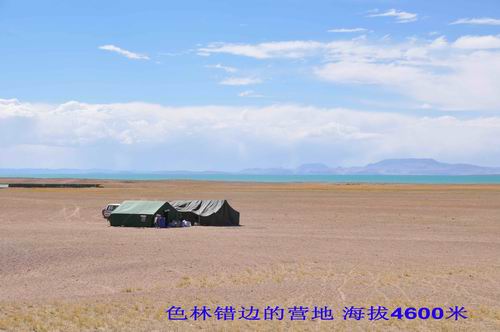
Newsroom
IHB Researchers Finish Lake Investigation in the no-man areas of Northern Tibet

The camp resided besides the Selincuo Lake is 4,600 meters above the sea level
An eight-member research team, led by CHEN Yifeng, Professor of the Research Group of Biological Invasion and Adaptive Evolution at Institute of Hydrobiology, Chinese Academy of Sciences (IHB), finished their 40-day lake investigation in the no-man areas of Northern Tibet.
Qinghai-Tibetan plateau, its hinterland Qiangtang plateau in particular, is sensitive to global climate changes. The investigation aimed to reveal the influence of global climate changes on the lake ecosystem in the plateau region. Resided besides the Selincuo Lake which is 4,600 meters above the sea level, the research team overcame a series of difficulties, e.g., plateau hypoxia, cold and dry climate no freshwater, strong wind, variable and changeable weather, no electricity and no communication signal etc.
The Selincuo Lake as the base, the research team conducted researches on the gradient change of the ecohydrological factors in Selincuo Lake, the reproduction of Selincuo Schizothoracini (Gymnocypris selincuoensis) and their early development and growth, fishery resources in Selincuo Lake etc. They found, for the first time, the spawning ground of Selincuo Schizothoracini and collected a great number of fertilized eggs and larvae. The research team also investigated the physicochemical factors, planktons and benthic organisms in over 20 lakes in the Northern Tibet, obtaining plenty of useful data and information.
|
Researchers conduct investigations in over 20 lakes in the Northern Tibet. |
Researchers cast net in the Selincuo Lake of Northern Tibet.
|
The Research Group of Biological Invasion and Adaptive Evolution has long been engaged in the study of water ecosystem of the Qinghai-Tibetan plateau. IHB Prof. CHEN Yifeng once conducted systematic investigation and research in the Qiangtang plateau for two consecutive years in 1997 and 1998. The current investigation is not only a review of the previous work, but also an examination of the dramatic change taking place in the lake environment and water ecosystem over the past decade. The research team observed that glacier retreats apparently in the Qinghai-Tibetan plateau so that the adjacent lakes stored more water which then raises the water level of the lakes, enlarges the total area of the lakes. The camp site which was located besides the Selincuo Lake 12 years ago is now inundated by the elevated saline–sodic lake water.
The research team will later analyze the collected samples and data, and further study the response of lake ecosystem in the plateau region to the global climate changes.
|
Researchers select the collected samples. |
Researchers select the collected samples in the camp before sleep. |